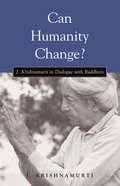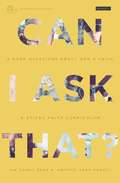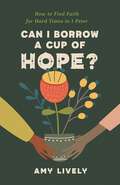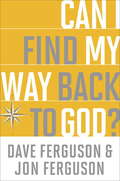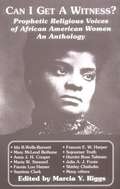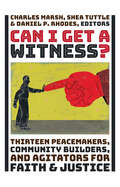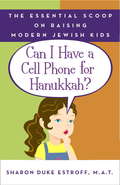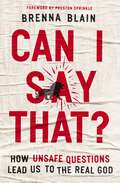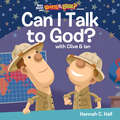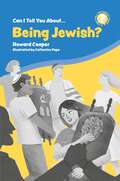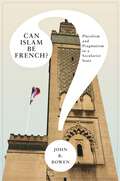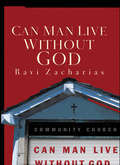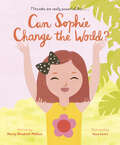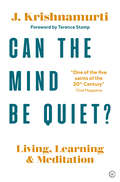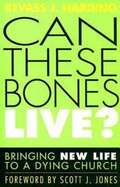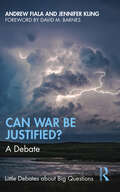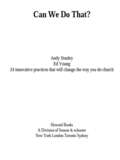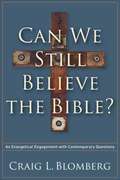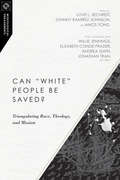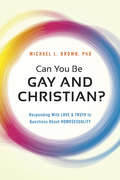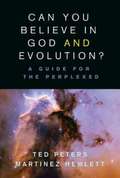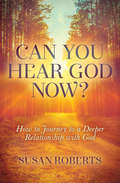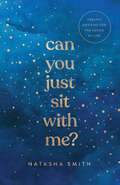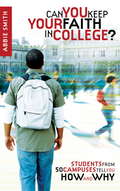- Table View
- List View
Can Humanity Change?: J. Krishnamurti in Dialogue with Buddhists
by Jiddu KrishnamurtiMany have considered Buddhism to be the religion closest in spirit to J. Krishnamurti's spiritual teaching--even though the great teacher was famous for urging students to seek truth outside organized religion. This record of a historic encounter between Krishnamurti and a group of Buddhist scholars provides a unique opportunity to see what the great teacher had to say himself about Buddhist teachings. The conversations, which took place in London in the late 1970s, focused on human consciousness and its potential for transformation. Participants include Walpola Rahula, the renowned Sri Lankan Buddhist monk and scholar, author of the classic introductory text What the Buddha Taught.
Can I Ask That? Student Guide: 8 Hard Questions About God And Faith
by Brad M. Griffin Jim Candy Kara PowellEver had a question about God that you were scared to ask? Ever felt like your hard questions get squashed, silenced, or brushed aside? We get that. We wrote this guide for people like you. And we have good news. First, other teenagers and adults ask these kinds of questions all the time. Second, it's not only okay to ask hard questions, but it's actually important-some say essential-for your faith journey. And finally, God can handle it. God isn't anxious about your questions, struggles, or doubts. We don't think you should be either.
Can I Borrow a Cup of Hope?: How to Find Faith for Hard Times in 1 Peter
by Amy Lively"Amy is a gifted teacher and her words are just the right mix of clever, funny, and profound."--Peggy Bodde, founder of Sacred WorkWhen the pain and problems of life barge in, hopes and dreams run out. In these uncertain seasons of personal crisis, national chaos, and global catastrophe, it's easy to wonder if life will ever be anything but sorrow and despair.The apostle Peter knows exactly what it's like when hope is gone. He watched as the Messiah was arrested, crucified, and buried. And Peter himself failed almost every test of his faith, even with Christ right in front of him. But he also knows that God is faithful and true, carrying us through our harshest suffering and redeeming our heaviest regrets. Bible teacher, author, and speaker Amy Lively dives into Peter's first epistle, a short letter with a lot of power, to light the way for today's struggling Christian. In this daily Bible study, she guides readers through the beautiful story of Peter and shows how he embodies the way to set our hope fully in Christ alone. With gentle honesty and a touch of helpful humor, Amy helps readers understand that when it feels like the end of the world to them, it's just the beginning of the power of Jesus."A beautiful, honest, and in-depth journey into 1 Peter. . . . You'll come away a little more humble, a little more thoughtful and introspective, and best of all, a whole lot more able to set your hope fully on Christ."--Jennifer Hayes Yates, author of Just Like Us and Seeking Truth
Can I Find My Way Back to God?
by Dave Ferguson Jon FergusonWherever You Are Right Now, You Can Move Toward God Do you believe God exists but struggle to connect with him? Do you feel like you've forgotten a God you used to know? Or do you feel that God has forgotten you? Most people say they believe in God, but many don't feel connected to God. That's just as real for long-time church attenders as it is for long-time spiritual wanderers. Many times in the course of our lives, we sense a distance between where we are and where we want to be. Dave and Jon Ferguson help you start right where you are and take the first step in finding your way back to God. Go further with the complete book by Dave Ferguson and Jon Ferguson Finding Your Way Back to God: Five Awakenings for Your New LifeFrom the Trade Paperback edition.
Can I Get A Witness? Prophetic Religious Voices of African American Women An Anthology
by Marcia Y. Riggs Barbara HolmesA chorus of voices of African-American women, from slavery times to the present, documenting the crucial links between faith and the struggle for justice.
Can I Get a Witness?: Thirteen Peacemakers, Community-Builders, and Agitators for Faith and Justice
by Charles Marsh Shea Tuttle Daniel P. RhodesHow do we transform American Culture through our religious convictions? Discover here the compelling stories of thirteen pioneers for social justice who engaged in peaceful protest and gave voice to the marginalized, working courageously out of their religious convictions to transform American culture. Their prophetic witness still speaks today. Comprising a variety of voices—Catholic and Protestant, gay and straight, men and women of different racial backgrounds—these activist witnesses represent the best of the church’s peacemakers, community builders, and inside agitators. Written by select authors, Can I Get a Witness? showcases vibrant storytelling and research-enriched narrative to bring these significant “peculiar people” to life.CONTRIBUTORS & SUBJECTS:Daniel P. Rhodes on Cesar Chavez Donyelle McCray on Howard Thurman Grace Y. Kao on Yuri Kochiyama Peter Slade on Howard Kester Nichole M. Flores on Ella Baker Carlene Bauer on Dorothy Day Heather A. Warren on John A. Ryan Becca Stevens on William Stringfellow W. Ralph Eubanks on Mahalia Jackson Susan M. Glisson and Charles H. Tucker on Lucy Randolph Mason Soong-Chan Rah on Richard Twiss David Dark on Daniel Berrigan M. Therese Lysaught on Mary Stella Simpson
Can I Have a Cell Phone for Hanukkah?: The Essential Scoop on Raising Modern Jewish Kids
by Sharon Duke EstroffHow do you help your child choose between mandatory baseball practice and Hebrew school? How can you plan a birthday party (not to mention bar or bat mitzvah party!) for your child without sacrificing your values, sanity, and pocketbook? How can you keep peace on the homework homefront? And how do you deal with Santa envy–let alone the entire month of December? As any modern Jewish parent knows, balancing family traditions and the realities of contemporary culture can be incredibly challenging. Answering questions both old and new, Jewish and secular, internationally syndicated parenting columnist and award-winning Jewish educator and mother of four, Sharon Duke Estroff illuminates the ways that Jewish tradition can be used to form a lasting, emotional safety net for modern families. Can I Have a Cell Phone for Hanukkah?is an instant classic. “A warm book full of tangible advice that will fashion children into committed Jews andmenschen; in short, into people who will be a blessing in their own lives and in the lives of all those whom they meet. ” –Rabbi Joseph Telushkin, author ofYou Shall Be HolyandThe Book of Jewish Values “Brimming with humor and strategy, love, and secret parent handshakes. ” –Melissa Faye Greene, author ofThe Temple Bombing, Praying for Sheetrock,andThere's No Me Without You “Sharon Duke Estroff has the uncanny ability to give solid, useful, and practical information on how to raise children while making you laugh out loud at the same time. ” –Stephen Nowicki Jr. , Ph. D. , ABPP, coauthor ofHelping the Child Who Doesn't Fit InandTeaching Your Child the Language of Social Success “I'm not Jewish, but I love this book. I laughed through it all while still appreciating the serious lessons it teaches. Every mom (and dad) with kids will find themselves nodding and smiling to themselves as they discover each other on every page. ” –Bonnie R. Strickland, Ph. D. , ABPP, former president of the American Psychological Association “This book belongs in the library of every parent and grandparent. ” –Atlanta Jewish Times "Can I Have a Cell Phone for Hanukkah is a valuable must-buy for all Jewish parents, and not just for Hanukkah. Not only does Estroff give practical child rearing advice but her joyful approach to Judaism is a healthy antidote to religious skeptics. " -Hadassah Magazine "Estroff’s witty, sympathetic tone and her attention to ethical matters make her a refreshing authority. ” - Jewish Living Magazine "Sharon Duke Estroff’sCan I have a Cell Phone for Hanukah? is a wise, witty, and insightful guide for parents — both Jews and non-Jews — who are faced with navigating their way through the shoals of contemporary American life. " - Deborah Lipstadt PhD, History on Trial: My Day in Court with David Irving "One of the best parenting books I've read this year. " -Five Minutes for Mom Blog "Sharon Duke Estroff has come to the rescue of parents raising children in today's 'overachieving, anxiety- filled culture,' with her concise, insightful and often hilarious guideCan I have a Cell Phone for Hanukkah?The Essential Scoop on Raising Modern Jewish Kids. " -Jewish Independent "From play dates, homework and extracurricular activities, to bar/bat mitzvah,tzedakah and Jewish holidays, with humor and insight Estroff offers suggestions for coping with the day-today challenges of Jewish parenting. . . an easy read packed with a lot of good,practical advice. " -Chicago Jewish Star "WithCan I Have a Cell Phone for Han
Can I Say That?: How Unsafe Questions Lead Us to the Real God
by Brenna BlainCan God handle our hardest questions, biggest struggles, and secret doubts?We instinctively assume he cannot. We figure giving voice to those things will bring shame, rejection, and distance from him. But what if our hard questions don't need to function as an off-ramp from Christianity but can lead us closer to his heart? What if he is not afraid of our doubts but instead reveals himself in them?In Can I Say That?, Brenna Blain brings her fresh voice to those who feel unsafe or unwelcome in the church, acknowledging the incongruity between the church's actions and believers' lived experiences. As a Bible teacher and an advocate for those who have experienced abuse, molestation, and mental health crises, she creates space for readers to be radically honest and ask tough questions—Am I safe here? Why does your presence feel so lonely, God?—while pointing them to biblical, foundational truth.Leading the way with her own raw vulnerability and authenticity, Brenna shares her journey of wrestling with God and building intimacy with him as a result. Bravely exploring these deep places with Brenna will help you:Know in your guts that God accepts you as you are—even as you question, struggle, doubt, and hurtBe reassured that he is bigger than anything you face and can handle anything you bring to himExperience his love in the most tender and needy parts of your heartEngage complex questions about the institution of the church, wrestle with its abuses, and advocate for the Body of Christ to more closely reflect his heart God sees you and knows you—better than you know yourself. He doesn't need you to change in order for him to love you. He doesn't require you to be free of struggles in order for him to be close to you. He wants you to be your true self with him and be willing to engage with him deeply, so he can wow you with the beauty of his heart and character.
Can I Talk to God?
by Hannah C. HallFeaturing beloved characters Clive & Ian from the bestselling video series What's in the Bible?, CAN I TALK TO GOD? weaves the biblical truth of God's accessibility into a fun story with delightful illustrations, teaching little learners that God is always listening. "When you're worried, sad, mad, scared, or even happy...God is a very good listener!"Ian has lost his stuffed pony. He can't find it anywhere! When his big brother Clive encourages him to and ask God to help him find it, Ian learns how much God cares, and that He wants to hear about everything!
Can I Tell You About Being Jewish?: A Helpful Introduction for Everyone (Can I tell you about...?)
by Howard CooperWhat does it mean to be Jewish? Are there different ways of being Jewish? Can you be Jewish but not religious? In this friendly guide, 12-year-old Ruth explains the different ways a person can experience being Jewish, by introducing us to her family and friends.Documenting the lived experience of being Jewish, the book contains diary entries covering festivals, rituals, ethics, and what a relationship with God entails, as well as more challenging topics such as Israel, the Holocaust and anti-Semitism. Providing an excellent starting point for discussion with children, it also includes a helpful list of recommended sources for further information.
Can Islam Be French?: Pluralism and Pragmatism in a Secularist State (Princeton Studies in Muslim Politics #43)
by John R. BowenCan Islam Be French? is an anthropological examination of how Muslims are responding to the conditions of life in France. Following up on his book Why the French Don't Like Headscarves, John Bowen turns his attention away from the perspectives of French non-Muslims to focus on those of the country's Muslims themselves. Bowen asks not the usual question--how well are Muslims integrating in France?--but, rather, how do French Muslims think about Islam? In particular, Bowen examines how French Muslims are fashioning new Islamic institutions and developing new ways of reasoning and teaching. He looks at some of the quite distinct ways in which mosques have connected with broader social and political forces, how Islamic educational entrepreneurs have fashioned niches for new forms of schooling, and how major Islamic public actors have set out a specifically French approach to religious norms. All of these efforts have provoked sharp responses in France and from overseas centers of Islamic scholarship, so Bowen also looks closely at debates over how--and how far--Muslims should adapt their religious traditions to these new social conditions. He argues that the particular ways in which Muslims have settled in France, and in which France governs religions, have created incentives for Muslims to develop new, pragmatic ways of thinking about religious issues in French society.
Can Man Live Without God
by Ravi ZachariasIn this brilliant and compelling defense of the Christian faith, Ravi Zacharias shows how affirming the reality of God's existence matters urgently in our everyday lives. According to Zacharias, how you answer the questions of God's existence will impact your relationship with others, your commitment to integrity, your attitude toward morality, and your perception of truth.
Can Religious Life Survive? An Urgent Question Confronts the Church Today
by Fr. Thomas DubayCan religious life survive by attaining a shared vision of love, humility and unity throughout the Christian world?
Can Sophie Change the World?
by Nancy Elizabeth WallaceThis is Pay It Forward meets the #BeKind movement, as seen through a Jewish principle.It's Grandpop's birthday, and all he wants is one little thing: for Sophie to change the world.He wants Sophie to do a mitzvah—something kind for others. But what exactly does that mean?As Sophie shares, teaches, helps her friends, takes care of birds, and picks up litter, she wonders which of these acts, if any, might change the world. By performing this sequence of poignant mitzvahs with an open heart, unending empathy, and a big imagination, Sophie's about to discover that what sounds like an impossible task just might be the best way to live life.In this exploration of an essential part of Jewish traditional teaching, Sophie's efforts to grant Grandpop's wish show that the smallest acts of kindness are what truly change the world.TIMELESS: Mitzvahs are a time-honored tradition and a central part of Judaic practice. This universal, timeless picture book shares a meaningful message about doing good in the world that will always be welcome and needed.A JEWISH PERSPECTIVE: This story explores an aspect of Jewish culture that is applicable to anyone interested in improving their world, making it a book that is both relevant and relatable to kids who are Jewish and non-Jewish alike.SPREAD KINDNESS: This book shows a variety of kind actions and engages with how kindness and good deeds can affect and lift up friends, family, and entire communities.BEAUTIFUL ILLUSTRATIONS: The art in this book is bright and cheerful, perfect for engaging kids and getting them excited to learn how they, too, can change the world!Perfect for:• Jewish families• Jewish schools and learning centers• Teachers• Parents looking for books about kindness
Can The Mind Be Quiet?: Living, Learning and Meditation
by Jiddu KrishnamurtiOne of the greatest thinkers of the 20th century describes a series of his encounters around the world with a wide variety of spiritual seekers. Their questions and his answers explore the nature of the lived experience, the details of profound self-inquiry and how to live a fulfilled life.These 60 chapters, with titles like "Solitude Means Freedom", "All Seeking is from Emptiness and Fear", and "Life is an Extraordinarily Beautiful Movement", carry the essence of Krishnamurti's teaching style and profoundest wisdom. Each one reflects an encounter K had at different times during the sixties and seventies. It opens with a poetic account of the location where the encounter took place, plus occasionally a description of the seeker that K has met. The chapter then moves back and forth between the seeker and the teacher, giving the reader plenty to reflect upon.This is previously unpublished material. Readers will be captivated by the luminous prose and the piercing insight. The style is enigmatic and poetical but each chapter contains more than enough for the reader to consider, perhaps as a daily practice. In the style of Paulo Coelho they have the quality of fables, but the teaching is far more profound and challenging.
Can These Bones Live? Bringing Life to a Dying Church
by Kevass J. HardingThe pastor of a small congregation in a transitional neighborhood describes the ways in which he restructured worship, discipleship, and ministry to save a dying church.
Can War Be Justified?: A Debate (Little Debates about Big Questions)
by Andrew Fiala Jennifer KlingCan war be justified? Pacifists answer that it cannot; they oppose war and advocate for nonviolent alternatives to war. But defenders of just war theory argue that in some circumstances, when the effectiveness of nonviolence is limited, wars can be justified. In this book, two philosophers debate this question, drawing on contemporary scholarship and new developments in thinking about pacifism and just war theory. Andrew Fiala defends the pacifist position, while Jennifer Kling defends just war traditions. Fiala argues that pacifism follows from the awful reality of war and the nonviolent goal of building a more just and peaceful world. Kling argues that war is sometimes justified when it is a last-ditch, necessary effort to defend people and their communities from utter destruction and death. Pulling from global traditions and histories, their debate will captivate anyone who has wondered or worried about the morality of political violence and military force. Topics discussed include ethical questions of self-defense and other-defense, the great analogy between individuals and states, evolving technologies and methods of warfighting, moral injury and post-traumatic stress disorder, broader political and communal issues, and the problem of regional security in a globalizing world. The authors consider cultural and religious issues as well as the fundamental question of moral obligation in a world saturated in military conflict. The book was written in the aftermath of the war on terrorism and includes reflection on lessons learned from the past decades of war, as well as hopes for the future in light of emerging threats in Europe and elsewhere. The book is organized in a user-friendly fashion. Each author presents a self-contained argument, which is followed by a series of responses, replies, and counter-arguments. Throughout, the authors model civil discourse by emphasizing points of agreement and remaining areas of disagreement. The book includes reader-friendly summaries, a glossary of key concepts, and suggestions for further study. All of this will help students and scholars follow the authors’ dialogue so they may develop their own answer to the question of whether war can be justified. Key Features Summarizes the debate between pacifism and just war theory Considers historical and traditional sources as well as contemporary scholarship and applications Models philosophical dialogue and civil discourse, while seeking common ground Discusses issues of concern in contemporary warfighting and peacemaking, while offering an analysis of the war on terrorism
Can We Do That?
by Ed YoungNo matter how you ask the questions, the answer is always the same. Yes you can! You can incorporate innovative strategies into your church ministrystrategies that will affect not only the way you do church but that will dramatically impact the lives of current church members and help you in reaching out to your community. In this refreshingly practically book, Andy Stanley and Ed Youngtwo of America's most innovative and effective church leadersdeliver twenty-four creative ministry tools that you can adapt and use to help your own church be all God intends it to be. The inspirational stories on North Point Community Church in Atlanta and the Fellowship Church in Dallas are stories of small church plants that have grown into churches with weekend attendance of nine and fifteen thousand. But the true success of these dynamic churches is not revealed in their big numbers but in the lives that have been forever changed by the life-giving message of Jesus. What you learn in the pages of this book will enable you to change the lives of those you serve -- forever.
Can We Still Believe the Bible?: An Evangelical Engagement with Contemporary Questions
by Craig L. BlombergChallenges to the reliability of Scripture are perennial and have frequently been addressed. However, some of these challenges are noticeably more common today, and the topic is currently of particular interest among evangelicals. <p><p> In this volume, highly regarded biblical scholar Craig Blomberg offers an accessible and nuanced argument for the Bible's reliability in response to the extreme views about Scripture and its authority articulated by both sides of the debate. He believes that a careful analysis of the relevant evidence shows we have reason to be more confident in the Bible than ever before. As he traces his own academic and spiritual journey, Blomberg sketches out the case for confidence in the Bible in spite of various challenges to the trustworthiness of Scripture, offering a positive, informed, and defensible approach.
Can White People Be Saved?: Triangulating Race, Theology, and Mission (Missiological Engagements #12)
by Amos Yong Love L. Sechrest Johnny Ramírez-JohnsonWhite normativity as a way of being in the world has been parasitically joined to Christianity, and this is the ground of many of our problems today. Written by a world-class roster of scholars, this volume develops language to describe the current realities of race and racism, challenging evangelical Christianity to think more critically and constructively about race, ethnicity, migration, and mission in relation to white supremacy.
Can You Be Gay and Christian?: Responding With Love and Truth to Questions About Homosexuality
by Michael L. BrownThe question of how the church deals with homosexuality has become the great moral and spiritual issue of this generation. How do we respond to gay people who tell us how much they love the Lord and experience God’s power? How do we answer them when they say that the greatest law is the law of love, and that love requires us to embrace them as they are? What do we do with the argument that the Old Testament laws (such as the prohibition against homosexuality and the dietary laws) no longer apply? Gay and Christian? will provide solid biblical answers, clearly written and based on sound scholarship, in a compassionate way that causes the reader to wrestle with the issues and discover the biblical truth. The book also provides practical guidelines for ministry and shows readers how they can resist the gay agenda while reaching out to their gay friends and family.
Can You Believe in God and Evolution?: A Guide for the Perplexed
by Ted Peters Martinez HewlettNamed a 2007 Book of Distinction by the Sir John Templeton Foundation.The special edition of this award winning book celebrates the 200th birthday of Charles Darwin. Since, even before, the publication of Darwin's seminal work on evolution, science and religion have often been at odds. Even today culture wars continue to rage. How can I be faithful to God and fully enjoy the progress of science? Who is Charles Darwin and what did he actually say? Can you believe in God and evolution? Does teaching evolution corrupt our social values? How can you connect science and faith? Can science be a Christian vocation? So how can we interpret the creation story in the Bible?Authors Ted Peters and Martinez Hewlett give a balanced discussion of the impact of evolution to help church leaders understand the values at stake. They make the convincing case that Christians can connect their faith in God with a scientific understanding of evolution with integrity
Can You Hear God Now?: How to Journey to a Deeper Relationship with God
by Susan Roberts&“Based firmly on biblical truth . . . Practical steps to enter into an interactive relationship with God—where we talk to Him, and yes, He talks to us&” (Dr. Craig Von Buseck, editor at Inspiration.org). Can You Hear God Now? addresses the specific question of whether or not Christians believe God speaks to them individually. Many people pray, but few listen to God. Susan Roberts surveyed hundreds of people from various backgrounds, religious affiliations, genders, and ages, from twenty-four states and three foreign countries, to determine if and how they communicate with God. The survey reveals interesting trends in today&’s thinking about hearing God and how God speaks in a variety of fascinating ways. Many of those surveyed even share stories about their personal interaction with God. Can You Hear God Now? combines these stories with Biblical principles to encourage readers to develop their own two-way communication with God, making their spiritual lives come alive. &“The world is full of noise, but Susan Roberts&’s prayerful Can You Hear God Now? cuts through it all to find some needed holy clarity . . . It imparts confidence that hearing God&’s voice is a result of preparedness and openness to hearing what God has to say.&” —Foreword Reviews &“May be one of the most useful recent books on Christian faith and living . . . A book very much worth reading, studying, and applying.&” —Col. Alexander Shine (ret. army), lay leader for military chapels and Officer Christian Fellowship &“Susan Roberts&’ stories are credible and provide inspiring examples of God&’s interactions with normal and sane people. Her book brings acuity to our ears.&” —Dr. Marshall Shelley, director of the Doctor of Ministry Program, Denver Seminary
Can You Just Sit with Me?: Healthy Grieving for the Losses of Life
by Natasha Smith"Why are you still sad about that?" It takes time and space to grieve well, but often our culture doesn't afford us these things. Drawing from her own experience with grief, Natasha Smith invites us into a reflection on what it means to grieve and how to cling to hope even in our darkest moments. Instead of providing quick-fix solutions, this book creates space for us to take time to just sit and grieve, learn, and heal in healthy ways. In Can You Just Sit with Me? Smith provides personal stories, biblical reflections, relevant research, practical tools, and prayers that point us to God, who always sits with us in our grief. Whether we are grieving a loss or supporting a friend who is grieving, this book reminds us that every loss is worthy of the space and grace to grieve.
Can You Keep Your Faith in College?
by Abbie SmithIs it possible to keep a God-centered, adventure-based, Christ-driven life through college? Packed with encouragement specifically for these trying years, this resource compiles experiences shared by students from more than thirty-five schools across the nation. (Practical Life)
